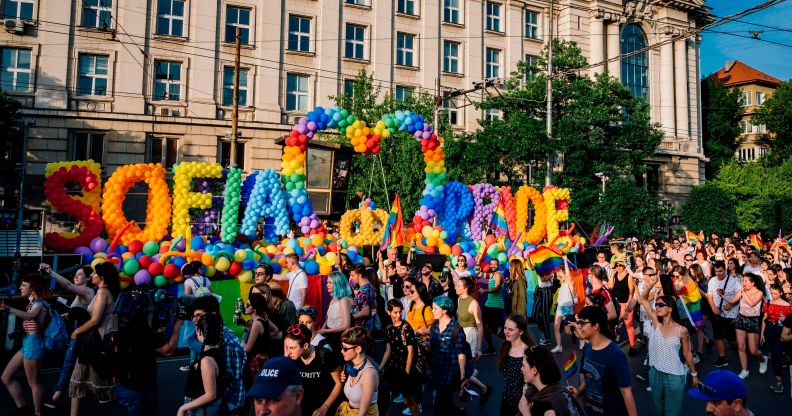Bulgaria ordered to recognise same-sex partnerships in historic ruling

Although the ruling does not mean Bulgaria must legalise same-sex marriage, the country is obligated to create a legal framework that recognises and protects same-sex couples. (Dimitar Dilkoff/AFP via Getty Images)
Bulgaria has been ordered by the European Court of Human Rights (ECHR) to establish a legal framework acknowledging same-sex relationships.
On Tuesday (5 September), the ECHR in Strasbourg ruled in favour of same-sex couple Darina Koilova and Lilia Babulkova, whose marriage in the UK was not recognised in Bulgaria, Balkan Insight reported.
Although the ruling does not mean Bulgaria must legalise same-sex marriage, the country is obligated to create a legal framework that recognises and protects same-sex couples.
“What is essential in this ruling is that, even though there is no specific deadline to implement the framework, the state is required to go through this process and in collaboration with the Council of Europe,” lawyer and human rights activist Denitsa Lyubenova, whose team represented the couple, told Balkan Insight.
According to Equaldex, while same-sex marriage is illegal in Bulgaria, LGBTQ+ people in the country do have some legal protections against discrimination.
Babulkova and Koilova have fought a seven-year legal battle to have their marriage recognised in Bulgaria. The pair have been together for over 14 years, and got married in the UK in 2016.
In 2017, the municipality of Sofia declined to recognise the couple’s marriage, as the country’s constitution defines marriage as an act between a man and a woman.
In 2020, after a lengthy legal battle, the couple filed a complaint against Bulgaria, claiming a violation of Article 8 of the European Convention of Human Rights, which protects the right to respect for private and family life.
In its ruling, the ECHR found that Bulgaria violated the rights of Babulkova and Koilova by not recognising their marriage.
“It is clear to the Court that to date the Bulgarian authorities have taken no steps to have adequate legal regulations adopted with regard to the recognition of unions between persons of the same sex,” the ECHR wrote in its decision.
In addition to this case, the couple is reportedly pursuing legal action at Sofia City Court to have Koilova’s surname changed.
In 2022, the European Commission against Racism and Intolerance (ECRI) called on Bulgaria to crack down on anti-LGBTQ+ hate after an LGBTQ+ community centre in Sofia was vandalised in an attack by fascists.
While the ECRI report praised Bulgaria’s progress on issues such as supporting refugees and fighting antisemitism, it claimed Roma and LGBTQ+ people in the country were “the main victims of public expressions of hatred and prejudice”.
The ECRI added: “Hate speech against these groups also came in recent years from high-level politicians.”
How did this story make you feel?

